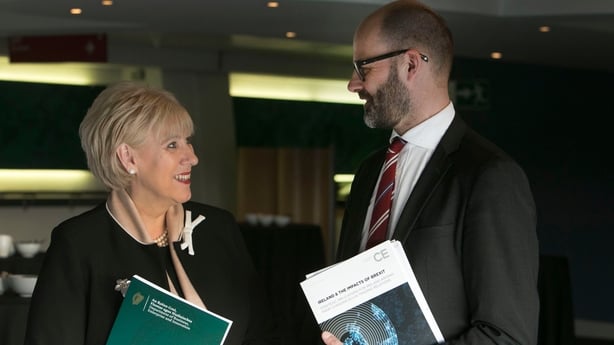Economist Martin Thelle has said the biggest risk facing Ireland from Brexit is a divergence of standards.
The Director of Copenhagen Economics, who recently wrote a report for the Government on the impacts of Brexit, said the impact of regulatory divergence is potentially bigger than customs procedures and tariffs.
Speaking at a conference at Croke Park on the trade impacts of Brexit today, Martin Thelle said there is no certainty the UK will diverge from common EU regulations.
But he said there is a risk that divergence will increase over time and that is potentially the biggest economic factor in Brexit.
Speaking at the conference, the Minister for Business, Enterprise & Innovation said that although the economy is expected to record strong growth up to 2030 regardless of what Brexit brings, it is clear that Ireland will be the most "Brexit-impacted" country in the EU.
Minister Heather Humphreys also said it was clear that the impact will fall most heavily on certain sectors, and on the regions.
The Copenhagen Economics report had showed that in all scenarios, the Irish economy is expected to grow but Brexit is expected to have a dampening effect on that growth.
The report said that under a relationship such as the EEA type scenario, the impact of Brexit would be to dampen growth by 2.8%. But in a worst-case WTO scenario that dampening effect could reach 7%.

Minister Humphreys outlined supports already being taken by Government to prepare for Brexit, including a €30m Regional Enterprise Development Fund, a €500m Disruptive Technologies Fund, a €300m Brexit loan scheme for SMEs and a €25m Brexit response loan scheme for the agri-food sector.
The Department of Foreign Affairs and Trade has also received more funding to open six new diplomatic missions as part of Global Footprint 2025, supports for businesses through the enterprise agencies, 100 extra staff for Enterprise Ireland and the IDA.
Speaking at today's conference, the Minister for Finance said that Brexit is a challenge of historic proportions for the country, for the Government and across the island of Ireland.
"The Government is working hard to plan for Brexit through the adoption of sound economic and budgetary policies that will stand us in good stead and ensure that we are well positioned to avail of the opportunities, and equipped to handle the challenges, that lie ahead," Paschal Donohoe said.
Checks may still be needed if standards not aligned - Creed
Minister for Agriculture Michael Creed said border checks could be required on the island of Ireland even if Britain strikes a "very satisfactory" customs agreement with the European Union if the post-Brexit deal does not keep standards aligned.
"Though we may negotiate a very satisfactory agreement on customs and tariffs, without having stitched into that an element to deal with regulatory alignment, we may well have a situation that, because of a divergence in standards, there's an obligation to have checks at borders," Mr Creed told reporters.
"The UK, who would then be free to conduct its own trade agreement, could be a backdoor for entry into the European Union market of products that are not regulatory equivalent to that which our manufacturers are obliged to meet," he said.
"Regulatory alignment is as important as the issue as customs and tariffs."
Britain's Brexit minister yesterday said that London and the EU could reach a deal to access each others' markets, and dismissed fears Britain would use Brexit to cut regulation to attract global businesses, despite past threats to do so.
Britain pledged in December that if it cannot strike the kind of trade deal it wishes, Northern Ireland would remain aligned with the rules of the EU's single market and customs union, both of which London is officially committed to leaving.

